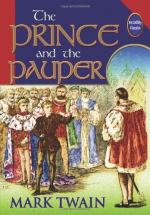Miles Hendon and Tom Canty were favourites of the King, all through his brief reign, and his sincere mourners when he died. The good Earl of Kent had too much sense to abuse his peculiar privilege; but he exercised it twice after the instance we have seen of it before he was called from this world—once at the accession of Queen Mary, and once at the accession of Queen Elizabeth. A descendant of his exercised it at the accession of James I. Before this one’s son chose to use the privilege, near a quarter of a century had elapsed, and the ‘privilege of the Kents’ had faded out of most people’s memories; so, when the Kent of that day appeared before Charles I. and his court and sat down in the sovereign’s presence to assert and perpetuate the right of his house, there was a fine stir indeed! But the matter was soon explained, and the right confirmed. The last Earl of the line fell in the wars of the Commonwealth fighting for the King, and the odd privilege ended with him.
Tom Canty lived to be a very old man, a handsome, white-haired old fellow, of grave and benignant aspect. As long as he lasted he was honoured; and he was also reverenced, for his striking and peculiar costume kept the people reminded that ‘in his time he had been royal;’ so, wherever he appeared the crowd fell apart, making way for him, and whispering, one to another, “Doff thy hat, it is the King’s Ward!”—and so they saluted, and got his kindly smile in return—and they valued it, too, for his was an honourable history.
Yes, King Edward VI. lived only a few years, poor boy, but he lived them worthily. More than once, when some great dignitary, some gilded vassal of the crown, made argument against his leniency, and urged that some law which he was bent upon amending was gentle enough for its purpose, and wrought no suffering or oppression which any one need mightily mind, the young King turned the mournful eloquence of his great compassionate eyes upon him and answered—
“What dost thou know of suffering and oppression? I and my people know, but not thou.”
The reign of Edward VI. was a singularly merciful one for those harsh times. Now that we are taking leave of him, let us try to keep this in our minds, to his credit.
FOOTNOTES AND TWAIN’S NOTES
{1} For Mark Twain’s note see below under the relevant chapter heading.
{2} He refers to the order of baronets, or baronettes; the barones minores, as distinct from the parliamentary barons—not, it need hardly be said, to the baronets of later creation.
{3} The lords of Kingsale, descendants of De Courcy, still enjoy this curious privilege.
{4} Hume.
{5} Ib.
{6} Leigh Hunt’s ‘The Town,’ p.408, quotation from an early tourist.
{7} Canting terms for various kinds of thieves, beggars and vagabonds, and their female companions.




